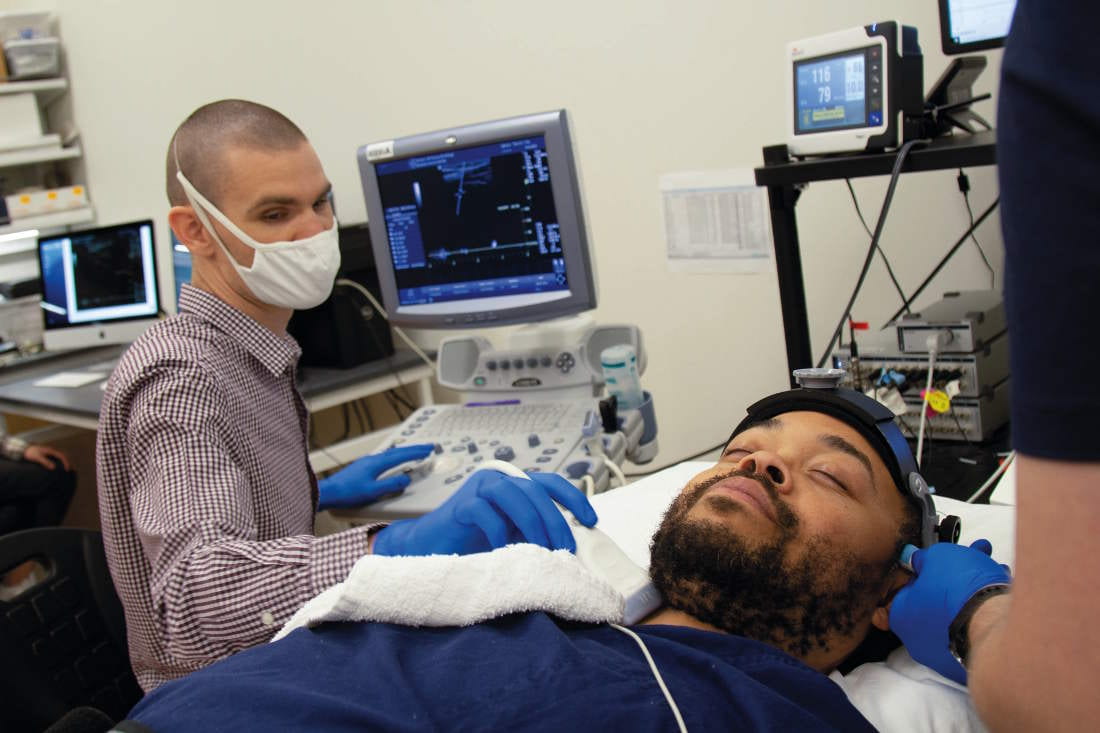DISMANTLING DISPARITIES
CONHI researchers investigate new ways to provide care for marginalized populations.
By Mike Kuhlenbeck
Ph.D. student Zachary Martin, M.S., conducting research inside the Integrative Vascular Physiology Laboratory led by Dr. R. Matthew Brothers.
 Despite remarkable strides in health care research, the field is still beset by disparities that can endanger patients’ lives. Researchers at the College of Nursing and Health Innovation are developing groundbreaking research aimed at improving health outcomes for marginalized populations.
Despite remarkable strides in health care research, the field is still beset by disparities that can endanger patients’ lives. Researchers at the College of Nursing and Health Innovation are developing groundbreaking research aimed at improving health outcomes for marginalized populations.
Medical and technological progress has improved Americans’ health and increased longevity over the last century, but as noted by the National Institute on Minority Health and Health Disparities (NIMHD), these advancements have not benefited everyone equally.
According to NIMHD, health disparities disproportionately affect “racial and ethnic minority populations, individuals of less privileged socioeconomic status (SES), underserved rural residents, sexual and gender minorities (SGMs), and any subpopulations that can be characterized by two or more of these descriptions.”
The COVID-19 emergency highlighted disparities that existed long before the pandemic. By harnessing decades of professional and personal experience in various areas of expertise, CONHI researchers have focused their investigations on groups that have been historically overlooked or neglected in health care research.
The COVID-19 emergency highlighted disparities that existed long before the pandemic. By harnessing decades of professional and personal experience in various areas of expertise, CONHI researchers have focused their investigations on groups that have been historically overlooked or neglected in health care research.
Dr. Elizabeth Merwin is a principal investigator of the study “Reducing Health Disparities in SMI, Rural, and Minority Populations,” sponsored by the NIMHD. The project is a continuation of an effort Dr. Merwin started at Duke University five years ago, before assuming her current role as Dean of CONHI on Feb. 1, 2019.
When people think of Medicare recipients, they usually think of people over the age of 65, but younger people with mental and physical disabilities are also eligible for Social Security benefits. Dr. Merwin and her team’s research examines recipients under 65 in addition to the more traditionally studied population to compare their outcomes.
“It will be useful to understand any disparities in outcomes for those involved,” Dr. Merwin said. “We’re hoping to figure out what works for different sub-populations and what doesn’t to better meet people’s needs. We are examining health trajectories of mortality over a 15-year period as well as other health outcomes for rural residents, those with serious mental illness, minority populations, and the disabled within the Medicare population.”
As CONHI is both the nation’s largest public university nursing program and the largest producer of baccalaureate-prepared nurses in the Lone Star State, they are especially invested in strengthening connections between health providers, patients, and their communities.
As reported by Becker’s Hospital Review, over 120 rural hospitals have closed across the United States since 2010; Texas has suffered the highest number of these closures with at least 20 rural hospitals shutting down in the same period. Populations in rural communities tend to be older and more impoverished, and on average, the residents of these communities have greater health risks but fewer resources for medical care, causing them to travel longer distances to get the care they need.
“Hospitals in rural communities are important in providing health care and jobs,” Dr. Merwin said. “When hospitals close, it means people have to travel longer distances, which can delay emergency care and be a barrier to access to care. It is also difficult for providers to stay in rural communities.”
“Hospitals in rural communities are important in providing health care and jobs,” Dr. Merwin said. “When hospitals close, it means people have to travel longer distances, which can delay emergency care and be a barrier to access to care. It is also difficult for providers to stay in rural communities.”
Dr. Jessica Smith, Assistant Professor in the Department of Undergraduate Nursing, told UTA’s student-run newspaper The Shorthorn last June that she worked as a registered nurse in a rural hospital until its closure in 2015 and witnessed firsthand the impact on the community.
“It’s been an interest of mine to address the problem of rural hospital closure for not only the rural population and their health, but for the nursing workforce who lose their jobs,” Dr. Smith said.
Dr. Smith received a Center for Research & Scholarship Pilot Grant to compare rural nursing job trends and outcomes for rural communities with a hospital closure compared to those without a hospital closure and investigate “how nursing resources could be modified to result in safer care in rural communities” for patients and staff members.
The grant proposal, “Exploring the Impact of Hospital Closures on Rural Nurses and Residents in Texas,” was awarded a grant from the Texas Organization of Baccalaureate and Graduate Nursing Education. Dr. Smith, the project’s principal investigator, is working with project co-investigator Dr. Kyrah Brown, Assistant Professor in the Department of Kinesiology, with Dr. Merwin as senior mentor.
Dr. Brown’s work is focused on investigating maternal and infant health among racial minority women, such as diabetes in reproductive-age women. Dr. Brown is the director of the Maternal and Child Health Equity Lab, the primary focus of which to investigate “the individual, community, and systems-level factors that shape the health and birth outcomes of Black women across the life course.”
Dr. Brown’s research lab is investigating social and health system factors disproportionately impacting the birth outcomes and health of Black women by using community-based participatory methods, systems science, and secondary data analysis.
“Persistent racial and social inequities in maternal and child health remain a significant public health issue,” Dr. Brown said. “These inequities are driven largely by conditions in which women are born, grow, live, work, and age. Importantly, these conditions are created by structural forces such as systemic racism that manifest as policies and practices in social and health institutions. Black women, in particular, tend to experience higher rates of preventable chronic health conditions, maternal health complications, and adverse birth outcomes compared to other racial groups.”
Dr. R. Matthew Brothers and Dr. Jordan Patik are investigating mechanisms of impaired autonomic and vascular function in marginalized populations.
Historically, Black women have been left out of blood pressure research, which even in 2021 tends to primarily concentrate on men. Dr. R. Matthew Brothers, Associate Professor in Kinesiology and Lab Director for the Integrative Vascular Physiology Laboratory, said women in general and especially Black women have been understudied—a fact “that has been alarming to me and my colleagues,” he said.
To help fill the research gap, Dr. Brothers is working alongside Dr. Paul Fadel, Associate Dean for Research, and Dr. David Keller, Associate Dean and Chair for the Department of Kinesiology. The team is studying the neural and vascular mechanisms of elevated blood pressure and cardiovascular disease in Black women, with an emphasis on how alterations to blood pressure (using antioxidants and other interventions) affect its regulation and blood vessels’ ability to relax or dilate.
“The African American population always has the highest risk for cardiovascular diseases,” Dr. Brothers explained. “We’re moving to help the scientific community have a better understanding of why individuals are at risk.”
With Dr. Brothers serving as principal investigator, the research team received a National Institute of Health (NIH) R15 grant, examining “Vascular Mechanisms of Elevated Cardiovascular Disease Risk in African American Women,” and is recruiting research participants.
Dr. Tiffany Kindratt, Assistant Professor in the Kinesiology Department’s Public Health Program, is engaging in cutting-edge epidemiological research studies focused on Arab Americans. Dr. Kindratt examines factors such as how patient communication influences morbidity, mortality, and use of health services by utilizing big data methodologies.
In 2020, the American Journal of Preventive Medicine published an article by Nadia N. Abuelezam, Sc.D., who cites Kindratt’s scholarship in her explanation of the numerous reasons why Arab Americans may be at increased risk of COVID-19 infection, related complications, and even death.
According to Abuelezam, these factors include “exposure to xenophobia and stigma, pre-existing conditions, crowded living conditions, lack of social support for new immigrants, and poor adoption of prevention behavior.”
For example, the 2020 Census did not identify Arab Americans as a distinct racial and ethnic category. They are often asked to identify as white non-Hispanics, despite emerging evidence indicating they cannot be classified by traditional immigrant health patterns. The lack of a proper identifier to address Arab American individuals, which ignores the unique risks and factors regarding their health as a population, needs to be rectified.
Dr. Kindratt has said she hopes her work and that of fellow researchers will help Arab Americans be placed in their own category in the 2030 Census.
As Director of the Health Services Research Laboratory, one of Dr. Kindratt’s current projects includes research into the “Prevalence of Diagnosed and Undiagnosed Alzheimer’s Disease and Related Dementias among Arab Americans,” sponsored by the NIH and funded by the National Institute of Aging.
The COVID-19 crisis wears on amid other, decades-old health care challenges, and CONHI is continuing to break down barriers to help all members of future generations be treated with respect in health care settings. The breadth and variety of research being conducted at CONHI lives up to the spirit of the college’s vision statement of providing “innovative, exceptional education, research, and practice opportunities to those committed to advancing health and the human condition.”
“I’m very proud of our faculty,” Dr. Merwin said, “that they have chosen to focus on areas of health care that are so important to the quality of health care and reducing health disparities for vulnerable communities.”


